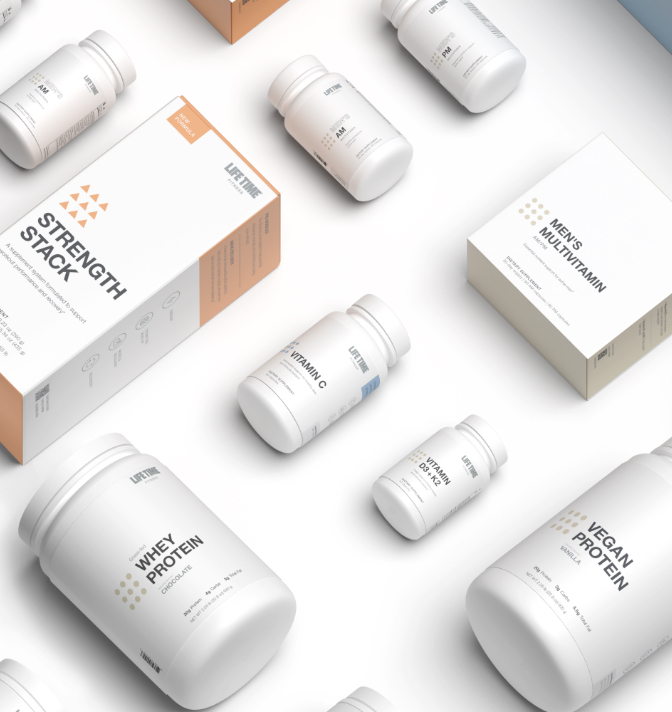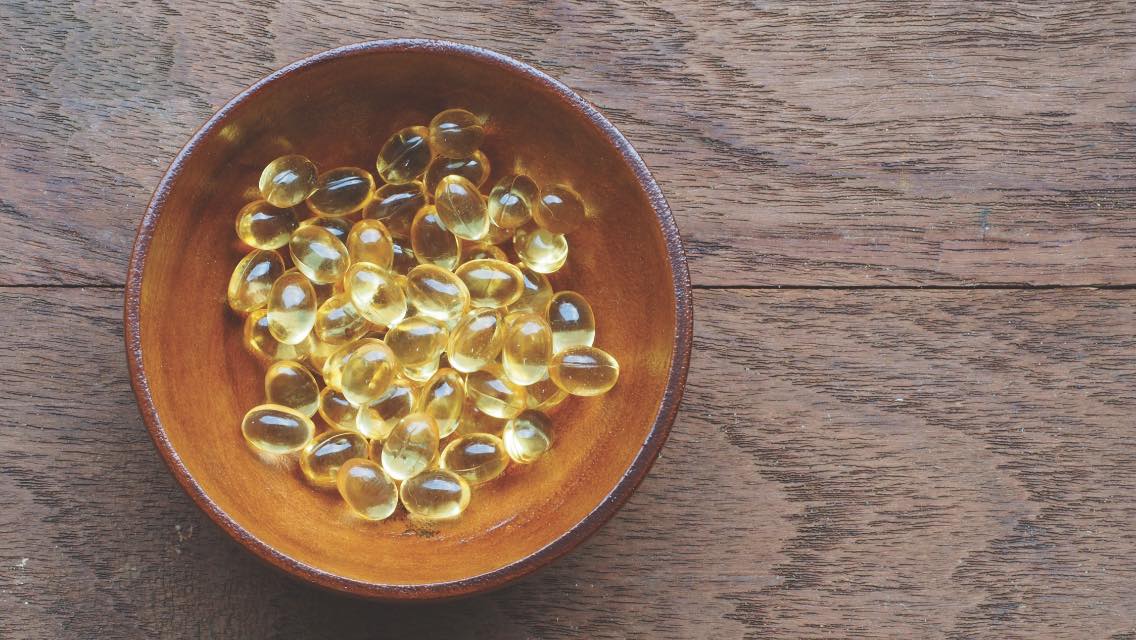Why Omega-3s?
With Paul Kriegler, RD, CPT
Season 5, Episode 9 | June 14, 2022
Without sufficient intake of omega-3s, our health can suffer: We might experience more inflammation, our cell signaling may be inhibited, and our cognitive health can take a hit. In this mini episode, Paul Kriegler, RD, explains why omega-3s are so essential and offers advice on how we can support our bodies with optimal amounts of this fatty acid.
Paul Kriegler, RD, CPT is the director of nutritional products at Life Time.
In this episode, Kriegler shares that the most reliable, economical, and consistent source of omega-3s for most people is in the form of a fish oil supplement. Here are a few things he says to look for to identify a a high-quality supplement:
- Make sure the species of fish is listed. “If the product doesn’t specify the species, it’s a big red flag,” says Kriegler. “It means they’re just getting crude, general marine omega-3 oil and you don’t know what it’s coming from.”
- Look for small species of fish. “Certain species of fish are extremely rich in EPA and DHA, and there are well-established processes for responsibly sourcing some of those species,” explains Kriegler. “For example, Life Time uses exclusively anchovy. It’s a very small species of fish, so it has a short lifecycle, which means they don’t have a lot of time out in the wild to bioaccumulate toxins from their environment. Contrast that with larger species of fish like tuna: They’re predatory fish, they’re eating other animals, and they’re accumulating all those other animals’ toxins as they mature.”
- Check it looks and it smells. “The fish oil itself, when it’s in supplement form, should be very transparent,” Kriegler says. “It shouldn’t be cloudy. It shouldn’t smell bad. Those are all red flags that the fish oil hasn’t been properly concentrated, deodorized, stabilized, and encapsulated.
- Life Time Omega-3 Fish Oil
- Fish Oil: Health Benefits of Supplementing For Your Body and Brain
- The Facts About Fat
- Are Your Supplements Sustainable?
- The Omega Balance
- 6 Critical Nutrients You Might Be Lacking
- The Ultimate Guide to Immune-Supportive Supplements
- (Re)Introducing Life Time’s Nutritional Products Line
- 5 Ways to Spot a Bad Supplement

Nutritional Supplements
Optimize your nutrition and fill in nutrient gaps with daily essentials and specialty supplements.
Also Explore:
Protein Powder
The Foundational Five Supplements
ADVERTISEMENT
More Like This
Fish Oil: Health Benefits of Supplementing for Your Body and Brain
Learn the numerous health benefits that can come from supplementing with a high-quality fish oil.
6 Critical Nutrients You Might Be Lacking
Your health depends on supporting your body with the right levels of nutrients. Learn which ones you’re most likely to be lacking — and how you can best boost your supply.
The Omega Balance
A guide to understanding omega-3 and omega-6 fatty acids and how they influence your health.
Transcript: Why Omega-3s?
Season 5, Episode 9 | June 14, 2022
[MUSIC PLAYING] Welcome to another episode of Life Time Talks. I’m David Freeman.
And I’m Jamie Martin.
And we’re going to be talking about omega 3 today. And we got Paul Kriegler. We’re going to give a little background on Paul. He’s a registered dietician and personal trainer who has worked for Life Time for over 13 years.
Started as a director of nutritional products Life Time and consults on a number of other scientific and health related topics all at Life Time. So he’s a runner as well. What have you done? Several marathons in three Ironman Triathlons. Can we say beast mode over here?
Beast mode.
Yes, welcome. How are you doing?
It’s good to be here, David. I’m doing well.
Glad to have you back. So omega 3 that’s what we’re going to be talking about today. Let’s dive right in.
Sure. What do you want to know?
All about them. I mean, most people probably say there’s different forms, you got omega 3, omega 6. Like when we actually think about the purpose of omega, what are they?
Omega 3s are a class of polyunsaturated fats. Omega 6 are another class of polyunsaturated fats. And that just describes their chemical structure. We don’t have to get into the chemistry of it necessarily, but omega 3s have their first double bond on the third carbon of the chain that’s why they’re called omega 3s. And there’s four different types of omega 3s. I don’t know if you want me to expand on those four types of omega 3s right now.
I don’t know them, but go for it.
Sure. We talk about them a lot or people hear about them a lot because they’re an essential nutrient which means the body can’t really make them in sufficient quantities to maintain it’s normal health or optimal health. So we have to consume them in our diet or from supplements. So that’s what makes them an essential nutrient is the body can’t keep up with the demand.
So even though there are four different types, can you just name them for us. So if somebody looking at a label and they want to know what omega 3s are that they should be looking for.
Sure. There’s one that comes from plant. It’s ALA or alpha-Linolenic acid, and that’s actually the one that’s essential. The body cannot make that one.
However, the body can take that from the diet or supplements and convert it to other forms of omega 3s which are eicosapentaenoic acid and docosapentaenoic acid and another one that’s called DPA omega 3, which is less important. But EPA and DHA, so the second and third ones I mentioned are of primary importance to all of our cell membranes and red blood cell health and basically all the tissues in our body, including our skin, our eyes, digestive system, heart muscle. They’re essential for the health of all of our cell membranes.
So what happens if we are deficient in omega 3s?
Everything gets worse. Everything.
Summed up.
Everything, right? Yep.
Yep. So our ability to combat or handle inflammation or resolve inflammation, because inflammation is a natural process. It’s actually a really healthy process when it’s conducted properly by the body. But everything gets worse when we’re deficient in omega 3s.
Cell signaling, so hormones telling a cell to do something that a cell is supposed to do can’t happen normally. Cell membrane function, meaning letting nutrients and other signaling molecules in or out of a cell can’t happen normally. So in short, if you’re deficient in omega 3s, lots of things get worse in our physiology.
You often hear about it too as an essential for brain health. Can you speak to its role in cognitive health.
So omega 3s in cognitive health have to do with a couple of different mechanisms. One is just the structure of the neurons that our brain is made of and our nervous system is made of. They’re pretty delicate cells and they’re susceptible to damage, whether that’s physical damage or oxidative stress like metabolic damage. And they’re constantly going through repair. So they’re constantly regrowing or repairing as they encounter damage because that’s what we do as humans, we just encounter damage everywhere.
But omega 3s have roles in maintaining the structural integrity of neurons as well as roles helping regulate the messages passing between neurons. And should something bad happen to that tissue, whether it’s like a concussion or metabolic stress, like a sudden drop in blood sugar or an incredible burst of oxidative stress from a super tough workout or from a toxin that the body’s trying to react to, omega 3s are involved in resolving that inflammation. So bringing homeostasis back to that tissue or that system. So that’s why they’re important for brain health and cognitive health.
I would say like a lot of listeners right now they want to consume the information and want to go apply it right away. So instead of just going out and getting any kind of omega 3 because it’s labeled as omega 3, all omega 3s are not created equally. What makes the difference of the actual benefits of what makes it the best omega 3 for you? Is it tested? Like, how do you know and how would you be able to determine what’s going to be the best one for you to take?
Are we talking supplements specifically?
Mm-hmm
The best, the most reliable source, the most economical source, and most consistent source for most people is to take a fish oil supplement. Certain species of fish are extremely rich in EPA and DHA omega 3 oils. And there’s well-established processes for responsibly sourcing some of those species.
For example, Life Time uses exclusively anchovy. So it comes from South Pacific right off the coast of Peru. The fishery is really well managed from a sustainable sense.
It’s a very small species of fish. So a short life cycle, which means they don’t have a lot of time out in the wild to bioaccumulate toxins from their environment, which as contrast that with larger species of fish like tuna they’re predatory fish. They’re eating other animals, and they’re accumulating all those other animals toxins as they mature.
So look for small species of fish. And pro tip, if the product doesn’t specify the species, it’s a big red flag. It means that they’re just getting crude general marine omega 3 oil and you don’t know what it’s coming from which just raises a lot of red flags.
And then the fish oil itself when it’s in supplement form it should be very transparent. It shouldn’t be cloudy. It shouldn’t smell bad. Those are all red flags that the fish oil hasn’t been properly concentrated, deodorized stabilized, and encapsulated. So those are a few things to look out for.
I was going to double down on that as far as the EPA, DHA as well as far as combined. I know you mentioned it. Does amount of milligrams matter in this case, as far as when you are starting to invest into that product? And if so, why?
Sure. For general purposes not as much. The body can convert some EPA to DHA if it needs more DHA and vise versa. So there are some instances where you might want to look for a higher EPA fraction in the fish oil versus a DHA. And there’s also some instances where DHA is the bigger priority.
DHA tends to be more beneficial for maturing nervous systems, so I think pregnancy, infancy, young childhood, whereas EPA has shown to be more beneficial for later stage diseases, like specifically lowering risk factors for cardiovascular disease. So throughout the life cycle can we split hairs and maybe build a case for a higher DHA or higher EPA? Sure. But when push comes to shove you just need your total omega 3s to be high enough or adequate enough.
So we’ve talked about supplements but I also want to talk about food sources because you can get omegas from food. So let’s talk about those. What are some good sources of omega 3s that we want to get more of in our diets?
Sure. Some of the plant sources that people are familiar with are walnuts, flax seeds, chia seeds. Those supply ALA, alpha-Linolenic acid.
However, humans are notoriously bad at converting ALA to the more useful EPA and DHA forms. That conversion happens at less than 5%. So if you ask me, you’re kind of wasting your time trying to get all of your omega 3s from plant sources.
Animal sources supply direct sources of EPA and DHA. The best sources for that are fish, so sardines, anchovies, mackerel, so cold-water fish species. Wild salmon is a good source as well, again, short life cycle even though it’s a larger fish. And then some other fish like tuna, those can be sometimes meaningful sources as well.
Does everybody need omega 3s? I mean, I should rephrase that because it feels like, are most of us deficient in omega 3 is then it would be benefit from taking them, like you said, because they’re essential.
I think so. My litmus test is asking people if they regularly consume one of those healthy fish sources, the top omega 3 sources at least three times a week. And I’m not talking about a 2-ounce portion. I’m talking like 8 to 10-ounce portion three times a week. And if they’re not getting that, I would be surprised if their blood or tissue levels of omega 3s came back in the optimal range.
That’s kind of a lot of fish to be eating each week.
Well, it’s expensive.
Yeah, I know. it’s probably in some cases supplementing is the way to go because it’s probably a little bit more cost effective as well.
Yeah, it’s very economical. It’s very reliable. And again, there’s really good methods for purifying and stabilizing those oils. So I think it makes a lot of sense for people to include omega 3 supplements into in their routine.
So being a parent, I just want to go to the children now, as far as how we could start to incorporate that. If they don’t like to eat fish or whatever it may be, is there a supplementation? Is that something that can be added to their regiment as well? And if so, because I’m assuming most kids probably don’t want to take fish oil pills, so like what would be a substitution there if you would have any hacks in that space?
I mean, of course, you want to check with the pediatrician and make sure you’re clearing all those choices through them. But liquids are a good option. Liquid fish oil, you can get a highly concentrated liquid fish oil. For example, we carry one from Thorne on our website. It tastes like raspberry lemonade. You really can’t tell that it’s fish oil.
Like really yum.
I mean it’s oily, but a teaspoon a day is like an adult dose.
Wow.
So pare that back a little bit for a kid and it’s an easy way to get omega 3s into their system.
Awesome.
One other question before we wrap this up is I know, David, you are vegan. And so you’re not eating any animals or any animal products. So what about for anybody who’s avoiding meats or anything like that, how can they make sure– because you said ALA is hard to convert in the body. What should those folks do or think about?
They should think about prioritizing some of the plant sources of omega 3s. So get what they can out of the plant sources and then consider an algal oil. So there’s a vegan-friendly version of omega 3s that it’s a marine source but it’s not technically an animal. So it’s from algae.
There’s more and more reliable supply chains producing high quality, more concentrated algal oils. It’s something that we’re looking into at Life Time as far as bringing in a new product as well. But to this date, it’s been challenging to establish a solid supply chain in that area.
Interesting. Any other questions?
No. I think he took us for a little ride there with the fish oil. I appreciate that.
Paul, anything else you want to add?
I don’t think so.
All right, there you go. That’s omega 3s. Thanks for coming back, Paul.
Thanks Paul.
Awesome. Thanks for having me.
[MUSIC PLAYING]
We’d Love to Hear From You
Have thoughts you’d like to share or topic ideas for future episodes? Email us at lttalks@lt.life.
The information in this podcast is intended to provide broad understanding and knowledge of healthcare topics. This information is for educational purposes only and should not be considered complete and should not be used in place of advice from your physician or healthcare provider. We recommend you consult your physician or healthcare professional before beginning or altering your personal exercise, diet or supplementation program.





